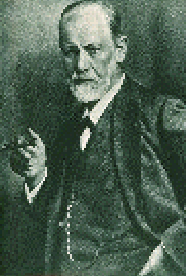A person
naturally or instinctively desires to be self-serving and
desires to exploit the fight for self-preservation. In
many ways, the individual is the "enemy of
culture," since culture itself demands that a person
denounces his/her individual and autonomous search for
personal gratification. Within society, a person seems to
conform and appears to forfeit their personal goals.
However, this is quite the contrary to the reality of an
individual’s psychological and emotional state
within society.
The instincts which a person cannot express, are
repressed but not forgotten. Indeed, these hidden
feelings or instincts are the source of neurotic
suffering and asocial acts which themselves threaten the
very framework of western civilization. When one defends
the preservation of a instinctually repressed feeling or
desire, the very fabric of society is tested and
endangered; this may provide insight into one of the many
negative general reactions towards political radicals and
such like persons who live on the fringe of society. The
social "Band-Aid" which bridges the gap between
society’s restraining of instinctual desires and the
disoriented feelings which result from this displacement
of desires is religion. Religion reconciles the everyday
sacrifice of one’s individual freedom and constant
constraint upon acting on natural or instinctual desires,
by the promise of a better life to come and the religious
sanctions or taboos which declare the social and moral
order to be God-ordained.
The other main question within Freud’s The Future of
An Illusion, is the relationship of religion to science.
Freud asserts that we must accept the reality of science
as opposed to religious doctrine. I claim that the
purpose of this work, is to assert the claim that humans
must subject religious phenomena and dogma to
psychoanalytic scientific investigation. During this
inquisitive process, we are returned and subsequently
confront our infantile unconscious mental life of
humanity and its primary mechanisms, wish-fulfillments.
In order to properly follow the investigative process of
religion, one must define illusion and delusion within
the religious realm.
Freud suggests that religion is not entirely erroneous in
its conception of reality. A delusion is just such an
error about the nature of reality. An illusion is a
manifestation of our unconscious wishes and a projected
fulfillment of infantile needs. Therefore, the typing of
religion as an illusion can be regarded as a factual
representation of reality. However, one must takes into
consideration that religion gives a complete expression
to an unconscious psychological reality and not objective
reality. From a scientific psychoanalytic point of view,
when findings pertaining to reality conflict between
those from religion and science, only the discoveries
stemming from physical science are valid. When one thinks
of religious dogma, one realizes that its teachings,
beliefs and scope extend beyond the spiritual realm and
flow into the physical. Freud claims that only science is
qualified to investigate and represent this earthly
reality. However, when the subject pertains to
ontological matters, religion remains the champion in
this field.
Religious illusion must bow before scientific truth. It
is in total error about the nature of the true world.
Only science is not illusion.
|

